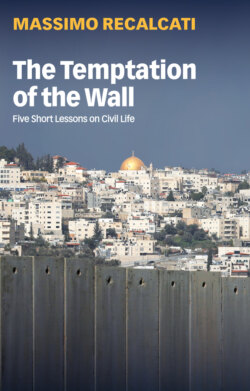Читать книгу The Temptation of the Wall - Massimo Recalcati - Страница 7
Warning
ОглавлениеThis book develops the central themes of Lessico civile, the short television series broadcast on Italy’s RAI 3 in spring 2020 and filmed prior to Christmas 2019. The collective trauma of Covid-19 had not yet reared its head. And yet, the reflections developed back then are still pertinent, even now, in the light of the tragedy that has befallen us.
Before the pandemic exploded, politics was consumed by the enormous global problem of immigration and the need to rethink how we integrate with those who are different from us. In this context, the symbol of the wall appeared as a sovereignist response to the imminent threat posed by the intruder. This sovereignism was not only a political temptation, leading to border closures, a greater military presence at those borders and the radicalization of the securitarian drive, but also reflected a profound mental inclination, as human beings have always drawn up borders, defended their own safety, rejected the risks associated with being open to the outside world.
In this context, the drive does not only manifest itself as a passion for freedom, adventure and travel, fed by a thirst for knowledge and social contact, but, as I repeatedly demonstrate in this book, it also reveals the urge to shut down, to refuse freedom, to avoid the radical responsibility this entails by choosing instead to barter it away in return for one’s own security. This is the temptation to wall oneself in, which any lexicon of civility must reckon with.
The trauma of the pandemic that has swept across the entire planet since early 2020 fatally reactivates this temptation as even our friends, those closest to us, our family members could be carriers of this disease. They are all potential agents of contagion. This is the ‘terroristic’ nature of the virus. It separates every conventional distinction between friends and enemies, people we know and those we don’t, those closest to us and those who couldn’t be further away. Faceless, not really identifiable, invisible, the virus is an intruder that lives in us and among us. Its omnipresence dominates our most established defence mechanisms. Social distancing has therefore had to replicate, by force, the tightening of borders, replacing openness with sealing off, promoting division over integration.
Anxiety over contagion, coupled with the necessary defence from the rapid and violent spread of the pandemic, have brought about the imposition of extreme security measures that have objectively restricted our individual freedoms. Some people have interpreted this by evoking the spectre of the totalitarian threat of a new power founded on the biopolitical control of life. But is this really the case? Has the traumatic onslaught of Covid-19, through the unforeseen social and healthcare emergency it unleashed, paved the way for the creation of a neo-totalitarian order that poses a threat to democracy’s very existence?
I do not believe so. From the perspective of freedom, the theme I have chosen to close this book of five brief lessons, the greatest lesson of this pandemic lies, in my opinion, in how it has laid bare the vacuous and purely ideological nature of freedom understood as individual property, and in how it teaches us that, ethically speaking, the greatest indicator of freedom is not that of choice or the unfurling of free will, but solidarity. Behind our being forced to give up our freedom to fight the aggression of Covid-19, there is no sacrificial phantom, no vocation for penance, nor any attack on our collective freedom, but the profound idea that no one can save themselves, that freedom without solidarity is an empty word.
When revisited in the light of this terrible emergency in which we are still fully immersed, this small book carries a message that I hope will not be ignored. It can be summed up with the words of Pier Paolo Pasolini evoking St Paul that bring this series of lessons to a close: without the word ‘charity’, without the word ‘love’, the words ‘faith’ and ‘hope’ remain shapeless and blind, in thrall to monstrous phantoms. The twentieth century saw millions of people massacred in the name of these monsters. Remembering the word ‘charity’ is the fundamental condition that will ensure the anonymous dimension of the multitude does not crush the irreducible character of singularity, so that we do not forget that at the basis of every lexicon of civility are the words ‘welcoming’, ‘hospitality’, ‘solidarity’. Because my heart, as this little book says, is the first name of the foreigner. And so, as psychoanalysis teaches us, every process of integration starts with the friendship I extend to the foreigner I carry inside me.
Milan, 25 April 2020
